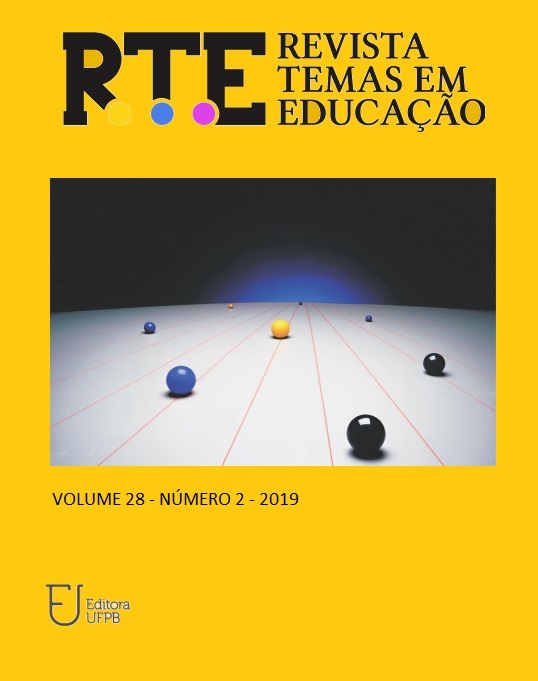THE WELL LIVINGAS A LIFE PHILOSOPHY: AND ITS CONTRIBUTIONS TO INTERCULTURAL EDUCATION
THE WELL LIVINGAS A LIFE PHILOSOPHY: AND ITS CONTRIBUTIONS TO INTERCULTURAL EDUCATION
DOI:
https://doi.org/10.22478/ufpb.2359-7003.2019v28n2.43653Keywords:
Well living, Life philosophy, Education, InterculturalityAbstract
We adopted the article o Bem Viverandino (andeanwell living) as a possibility of thinking about it as a life philosophy, placing it in the philosophical-educational debate for visualizing contributions to an intercultural education that could be able to recognize different identities, contrasts and rationalities. The objective of this paper is to reflect about possible openings and dialogues that can contribute to educational studies and projects that are instituting critical perspectives of education through different cultures, in order to decentralizeconceptions, ethnocentric discourses and practices, cognitive and monocultural that reproduce alienation and a lack of criticism, denying the corporal, spiritual dimensions and inventiveness of the contemporary generations. The philosophical hermeneutics was used, as it is critical, therefore as a reference for this reflection and dialogue with some authors who offered theoretical-methodological subsidies that sustain the debate of intercultural in Education such as: Paulo Freire, Vera Maria Candau and Reinaldo Fleuri among others. It was concluded that although hegemonic thought remains in the school culture, the openness to the intercultural into the educational-philosophical thought has become inevitable, increasing the challenge and, at the same time, increasing the sources held in cultural and epistemological different perspectives of education.
Downloads
References
ACOSTA, Alberto. O Buen Vivir: Uma oportunidade de imaginar outro mundo, 2011. Disponível em: <http://br.boell.org/sites/default/files/downloads/alberto_acosta.pdf> Acesso em 14 de dez. 2018.
BHABHA, Homi K. O local da cultura. Belo Horizonte: Ed. UFMG, 1998.
CANDAU, Vera Maria. Diferenças culturais, cotidiano escolar e práticas pedagógicas. Currículo sem Fronteiras, v. 11, n. 2, p. 240-255, 2011.
______. Direitos humanos, educação e interculturalidade: as tensões entre igualdade e diferença. In: CANDAU, Vera Maria. (Org.). Educação intercultural na América Latina: entre concepções, tensões e propostas. Rio de janeiro: 7 Letras, 2009. p. 154-173.
CAVALCANTI, Anna Hartmann. Nietzsche e a história: o que nos faz pensar. [S.l.], v. 1, n. 01, p. 29-36, jun.1989. Disponível em: <http://www.oquenosfazpensar.com/adm/uploads/artigo/nietzche_e_a_historia/n1anna.pdf> Acesso em 14 dez. 2018.
DILTHHEY, Wilhelm. A construção do mundo histórico nas ciências humanas. Trad. Marco Antônio Casanova. São Paulo: UNESP, 2010.
DUSSEL, Enrique. Transmodernidade e interculturalidade: interpretação a partir da filosofia da libertação. Sociedade e Estado Vol. 31 nº. 1 Brasília, p. 51-73, Jan./Apr. 2016.
ECO, Umberto. Baudolino. 8 ed. Trad. Marco Lucchesi. Rio de Janeiro-São Paulo: Editora Record, 2010.
FLEURI, Reinaldo Matias. Interculturalidade e educação. In: Revista brasileira de educação. São Paulo: n. 23, Maio/Jun/Ago, 2003.
______. (Org.). Intercultura: estudos emergentes. Ijuí/RS: Unijuí, 2002.
FREIRE, Paulo. Pedagogia da autonomia. São Paulo: Paz e Terra, 2002.
GADAMER, Hans-Georg. O problema da consciência histórica. Organizador: Paulo Frichon – Trad. Paulo César Duque Estrada. 3 ed. Rio de Janeiro: Editora FGV, 2006.
GARCEZ, María C. Leme; MÉNDEZ, José Mario M. Repensar la Educación: aportes desde la interculturalidad y la pedagogia social. El Salvador: Editorial Universidad Dom Bosco, 2013.
GEERTZ, Clifford. A interpretação das culturas. Rio de Janeiro: Zahar Editores, 1978.
GUDYNAS, Eduardo. Buen vivir: Germinando alternativas al desarrollo. América Latina en Movimiento – ALAI, nº 462: 1-20, fev. 2011, Quito – Equador.
HECK, Egon Dionísio; SILVA, Renato Santana da; FEITOSA, Saulo Ferreira (Org.). Povos indígenas: aqueles que devem viver – Manifesto contra os decretos de extermínio. Brasília: Conselho Indigenista Missionário (Cimi), 2012.
LIMA, Márcio José Silveira. Nietzsche e a história: o problema da objetividade e do sentido histórico. Cadernos Nietzsche n. 30, 2012, p. 159-181.
NIETZSCHE, Friedrich. Segunda consideração intempestiva: da utilidade e desvantagem da história para a vida. Trad. Marco Antônio Casanova. Rio de Janeiro: Relume Dumará, 2003.
PANIKKAR, Raimon. Paz y desarme cultural. Bilbao: Editorial Sal Terrae, 1993.
______. Paz e Interculturalidad: una reflexión filosófica. Trad. Gérman Ancochea. Barcelona: Herder, 2006.
PIERUCCI, Antônio Flávio. Ciladas da diferença. São Paulo: Editora 34, 1999.
ROTHACKER, Erich. Philosophische Anthropologie. Bonn: Bouvier Verlag, 1966.
SHÄFFER, Margareth. Entre-lugares da cultura: diversidade ou diferença? Revista Educação & Realidade, nº 24.1: 161-167, Jan/Jun 1999. Disponível em: < https://seer.ufrgs.br/educacaoerealidade/article/view/55813> Acesso em 15 dez. 2018.
STEIN, Ernildo. Antropologia Filosófica: questões epistemológicas. – 2 ed., ver. - Ijuí: Ed. Unijuí, 2010.
Downloads
Additional Files
Published
How to Cite
Issue
Section
License
Authors who publish in this journal agree to the following terms:
. Authors retain the copyright and grant the journal the right to first publication, with the work simultaneously licensed under the Licença Creative Commons Attribution that allows the sharing of the work with acknowledgment of authorship and initial publication in this magazine. . Authors are authorized to assume additional contracts separately, for non-exclusive distribution of the version of the work published in this journal (eg, publishing in institutional repository or as a book chapter), with acknowledgment of authorship and initial publication in this journal.
. Authors are permitted and encouraged to publish and distribute their work online (eg in institutional repositories or on their personal page) at any point before or during the editorial process, as this can generate productive changes, as well as increase impact and citation of the published work (See O Efeito do Acesso Livre).



















